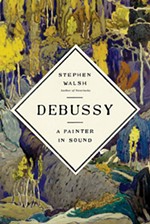Summer Schedule Highlights
By Graham Reynolds, Fri., June 4, 2004
Impressionist
Maurice Ravel: Sonata for Violin and Cello, Tziganne for Violin and Orchestra, June 12, 3pm and 8pm.
Maurice Ravel (1875-1937) lives in two shadows. The first is that his own composition, Bolero, which is simultaneously his most famous composition and one of his least representative. The other is that of Claude Debussy, the seminal, turn-of-the-century composer. Hidden in these shadows is a wealth of great music. Together, Ravel and Debussy form almost the entire category of impressionist music, and their composition styles are reminiscent of the movement's painters.
These two Ravel compositions are flip sides of the composer's style. The first, Sonata for Violin and Cello, is featured in the 3pm concert. The piece is subdued but entrancing, sounding like a Michael Nyman film score 90 years early. Unlike most sonatas, this work has no piano accompaniment, so the sounds of the violin and cello are naked and detailed while Ravel, famous for his orchestrations, manages to make it sound full and rich, never feeling the need for more instruments.
Tziganne for Violin and Orchestra is one of the most dramatic of Ravel's compositions, with a bold opening melody that sounds like a gypsy fiddler. This is a violin showcase and an audience favorite. As French and American music receive special focus at Festival Hill, you can expect these concerts to be of exceptional quality.
Classical
Schubert, String Quartet No. 14, "Death and the Maiden," June 25, 8pm
For the general listener, Franz Schubert (1797-1828) is a recognized name but little else. Falling in the cracks between Mozart and Beethoven, Schubert's reputation has had a hard time competing with those monumental figures. But there's a lot to be discovered. Schubert wrote quickly and often with varying results, so there's a lot to sift through. After sifting, Death and the Maiden almost always makes it toward the top of the list.
Schubert shows his tough side in this piece. As the title suggests, the quartet is dramatic, tragic. Fiery. Like the best of Beethoven, the piece has the grace and solidity of form associated with the Classical period but the passion and emotionality of the Romantics.
Avant-Garde
"Homage to Charles Ives," July 2, 8pm
The story of Charles Ives (1874-1954) ranks among the least likely. Insurance man in one life, composer in another, he somehow rose from obscure experimenter to one of the most recognized names in 20th-century composed music. Like John Cage, Ives has a tendency to be talked about but not heard.
One couldn't ask for a better way to remedy that than this concert, which utilizes Festival Hill's specialization in American music and a diversity of instruments not often found in chamber music. The eclectic of eclectics, Ives' music in this concert, and throughout his output, runs from style to style, idea to idea. You'll hear the undiluted spirit of John Philip Sousa, Brahmsian Romanticism, and modernist harmonic experimentation to name a few.
Romantic
Liszt, Piano Concerto No. 2 in A Major, July 10, 8pm
More than 100 years before Elvis or the Beatles, Franz Liszt (1811-1886) was the first rock star. Princesses and Duchesses screamed and fainted at his concerts; he was courted by kings, emperors, and even the pope. He was a great artistic experimenter and the most prolific composer since Bach.
Before Liszt, musicians were servants who entered through the back door, humbly creating music for their master's pleasure. Not only did Liszt command the front door entrance, he put composers and musicians in a place of reverence they still retain today. He was a pivotal figure both musically and socially, leaving his mark on everything he touched.
This piano concerto is the perfect representative for the Romantic period. Sweeping and overtly dramatic, it's emotionalism set to 11. At the same time, the piece, like so much of Liszt's work, is boldly experimental and non-traditional in form (some critics like to say lacking in form). Most listeners will hardly notice, as our ears have grown accustomed to these sounds. Themes unfurl more like a narrative than any standard classical music form.
Baroque
Bach, The Goldberg Variations, Aug. 28, 3pm
Johann Sebastian Bach (1685-1750), the forefather of all that is Western classical music, wrote about as much music as Mozart, Beethoven, and Stravinsky combined. Variously employed by the church and noble families, he wrote music for any event. One church, for example, required a full cantata, a multi-movement work scored for chorus, soloists, and orchestra, each and every week.
Sorting through all that work is a lifelong commitment, but a few pieces stand above the rest in their quality, impact, and persistent relevance. The Goldberg Variations is one of those pieces. This seminal work is also an audience favorite, friendly to the untrained ear. The scope of Bach's inventiveness comes through clearly in this work.








